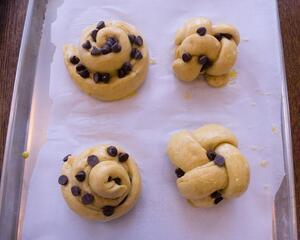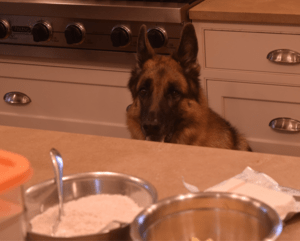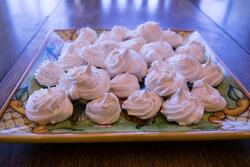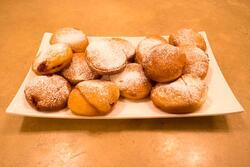A Conversation with Food Writer Lisa Yelsey
JWA’s food writer, Lisa Yelsey, has been cooking and writing for Jewish Women, Amplified for almost a year! In celebration of her delicious recipes, her dog, Cassie (aka the cutest German Shepherd to be featured in an article about roasted vegetables), and teaching us how to bake and watch TV (the key is autoplay), I asked Lisa about how she got her start in food writing, how to update a traditional recipe for modern palates, and what she does when a recipe isn’t turning out quite right.
You sort of “fell into” food writing in college. When did your interest in food writing first take shape? What draws you to this form of storytelling?
In college I was doing a ton of cooking for Hillel, which I enjoyed but kvetched about constantly, as is the way of our people. I went to Swarthmore, a tiny school where we had a small, grody Kosher kitchen in a basement. My sophomore year, I went through a weird phase of reading a ton of vegan websites (I’m vegetarian, never vegan) and offered to cook for many Shabbat dinners.
A friend was on the school’s online paper and asked if I wanted to write a baking column. Even though I’d never done anything like it before, I basically sat down to write up a cookie recipe I’d recently made, and an hour later had written 1,000 words and thought “oh, I love this?”
I like food writing because a) I love talking about myself, b) it pushes me to take my baking to a higher level, and c) writing about a specific experience gives me the much-needed purpose and structure to create a cohesive piece of writing.
It helps to have something really concrete to research and figure out how to write about. I tend to become pretty consumed by whatever I’m developing and researching, and have a million tabs and spreadsheets open on my computer. A little while ago I mentioned cake pops and a friend said “Oh yeah, I remember the month where that was a significant amount of your whole personality.”
We love your updates on traditional recipes, like your apple cake and the pumpkin spice rugelach. What is your planning process when it comes to updating traditional recipes? Do you have any people you make sure to consult?
Thank you! That’s one of my favorite things to do. Typically I’ll have a seasonal or holiday-specific flavor or food in mind, and a vehicle (bread, donut, etc) I want to work with. When updating a traditional Jewish holiday recipe, I try to figure out what makes it significant for the holiday (round challah for Rosh Hashanah, dairy for Shavuot, etc) so I am keeping the spirit of the tradition.
When making any decision in my life, I consult every single person I know, so yes, I always have people I consult. I mostly talk to my family and every friend I am messaging with at the time. If the responses are more “I guess that could be good?” than “ehh,” then I go for it. If I can’t defend a baking idea or update on a traditional food, I either rethink it or don’t do it.
How does food, and food writing, connect you to your heritage?
I think a lot of my stronger childhood memories of food are connected to Judaism, largely because of large family gatherings. My mother has always made amazing kugel, latkes, matzoh ball soup, etc. One of the first things I ever cooked was latkes with my mom, and it’s is still something we try to do together every year.
I don’t know if I even would have ever gotten into food and baking without Judaism. After cooking for my college Hillel, it really snowballed, but it means that most of my formative cooking memories are for Jewish holidays at home or in the kosher kitchen with my friends in college. It definitely reminds me of the long tradition of Jewish holidays and food bringing people together. For me, food writing is really the main intersection of my dual interests: running my own business and staying home and baking all the time.
This spring, you spoke with Joan Nathan about her book King Solomon’s Table. What was that experience like?
The whole experience was wonderful! I am a huge fan of Joan Nathan, and my mother and grandmother both have a number of her cookbooks. A lot of my love for Jewish cooking comes from the intergenerational conversation, so this felt really special.
Joan was so generous with her time and answers during the whole interview. She was very willing to dive into family history and detailed explanations of her recipes and the extensive research she does for each recipe and book. Although transcribing the interview was a horrible experience in listening to myself say “um” a hundred times, I feel so grateful for the opportunity.
You always include a recommendation for a show to watch while making your recipes. What are the best shows to cook to?
I try to avoid anything with a ton of complexity while I’m cooking since I’m often only half paying attention. Rewatching a show, or watching a show you enjoy but don’t need to catch every minute detail of, can be the best option.
Also anything on a streaming service that autoplays each next episode so you don’t have to stop baking to wash your hands/touch your tv or computer/wash your hands again is great.
My recommendations are probably Brooklyn 99, Jane the Virgin, Great British Bake Off, One Day at a Time (Netflix remake), or Bob’s Burgers.
How do you stay motivated when a recipe isn’t working out?
While I’d love to claim this never happens, occasionally something just won’t work out and I’ll need to regroup a little bit. Before starting any recipe, I try to do a lot of groundwork, research, and planning to give myself the best chance for success. Because of that, it can be startling and frustrating when an idea doesn’t pan out.
Staying motivated is just remembering the earlier research and preparation around the recipe. If I’m excited to make babka, and it doesn’t turn out, I still have that desire to make a good babka. I want to live up to my own earlier expectations of myself and what I’m capable of, even if I have a minor setback.
Honestly, it also helps that I’m making some of these recipes for publication. I have to get them perfect in order to publish in good conscience!
We love your dog! Can you tell us more about her? How did she become a character in your recipes?
THANK YOU! Cassie is a good dog, probably the best dog. She’s a nine-year-old German Shepard but her doggie day care once said she has a “puppy-like personality,” which is true. She became a character in my recipes because she loves to be in my way when I’m cooking. Her favorite move is, if I am standing at the counter, to take a squeaky toy and squeak it against the back of my legs over and over again until I pay attention to her. She makes her presence known! She is also VERY interested in anything using butter or cream cheese, even though she’s not allowed to have either.









